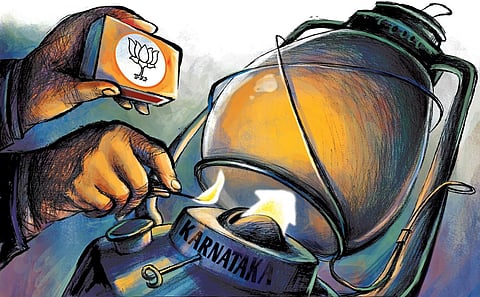

For obvious reasons, Karnataka Assembly elections have become extremely important. Voting is just around 20 days away, and it is pertinent to ensure that voters are empowered to make an enlightened choice. In the pre-2000 era, people used to routinely say that post-acquisition of power, all parties govern in a similar fashion. The performance of most parties in governance used to be almost equally good or equally bad.
But post-2000, the situation changed. Former PM Atal Bihari Vajpayee introduced ‘Good Governance’ as an important factor to be considered while comparing the performance of competing parties. Later, with Prime Minister Narendra Modi at the helm, ‘Politics of Performance’ entered the political lexicon of India.
Way back in 2014, it was thanks to his suggestion that the Public Policy Research Centre (PPRC) in Delhi conducted an objective analysis of the performances of political parties governing different states. The performances of state governments ruled by the Left parties, Congress, regional parties and the Bharatiya Janata Party were compared for a period of 20 years between 1991–2011. This report made some insightful observations: ‘With its strong commitment towards a responsive government, the BJP’s model of governance focuses on service delivery through legal mechanisms and application of e-governance. The Madhya Pradesh Public Service Delivery Guarantee Act, e-governance initiatives of BJP-ruled states like Sakala (Karnataka) and Swagat (Gujarat) have been widely recognised and appreciated.’ In yet another conclusion, the report said ‘All BJP-ruled states have shown remarkable and consistent economic growth. As evident above, BJP-ruled states have been consistently above 8% growth rate for GSDP.’
Today, this is relevant even in Karnataka as except for the BJP, no other contesting party has the courage to talk about ‘Politics of Performance’. Prudent fiscal management, smart administrative measures to ensure effective last-mile delivery, and ensuring that the ‘most deprived are considered as the most deserving’, in keeping with the principles of Antyodaya, are the three critical dimensions of the performance of the BJP government in Karnataka.
Let’s examine the fiscal conditions. With a revenue surplus of ₹402 crore estimated for 2023–24 compared to a revenue deficit estimate of ₹14,699 crore in the 2022–23 budget, Karnataka has now consolidated its position in the league of states with a high revenue surplus. The fiscal deficit of the state is estimated at 2.6 per cent of the GSDP for 2023–24, which is well within the 3 per cent limit prescribed under the KFR Act. The state’s performance in sectors like agriculture, manufacturing and services has been remarkable thanks to strict governance. Chief Minister Basavaraj Bommai, during his budget speech a few months back, had rightly claimed that for the first time, the capital and revenue expenditure had been 76 per cent till January and that number was not achieved by any government in the past. Notably, Karnataka is second in GST collection and the state’s growth rate stands at 7.8 per cent as against 6.8 per cent of the Government of India. All this indicates that projects and programmes are not just on paper, but being implemented on the ground.
Similarly, Karnataka has been acting as a great investment magnet due to its administration model. Notably, it was the top recipient state with 38 per cent share of the total FDI equity inflow ($83.57 billion) in FY 2021–22. During the calendar year 2021, Karnataka bagged an FDI of $18,554.29 million. In comparison, Tamil Nadu received $3,023.33 million, Telangana received $1,584.59 million, Kerala received $310.67 million, and Andhra Pradesh $178.09 million.
On the social development front, too, the state government has performed remarkably well. In the light of an improved fiscal situation and the need to do more for the vulnerable sections, it has gone the extra mile. Take the case of the former Devadasis. The state government has increased their pension from ₹500 (under the Congress government) to ₹1,500 per month, thereby helping more than 30,000 former Devadasis. Again, for old age homes, the BJP government has increased maintenance funds from ₹8 lakh to ₹15 lakh. Senior citizens in Karnataka also have a reason to be more happy. Here, the old age pension for people above 65 years under the Sandhya Suraksha Scheme has now been enhanced from ₹600 to ₹1000. Similarly, under the Pradhan Mantri Kisan Samman Nidhi Scheme, while the Central government gives ₹6,000 per head, Karnataka has been providing an additional assistance of ₹4,000 to each of the beneficiaries.
Karnataka’s performance in service delivery, too, merits attention. Karnataka has the second highest number of Jan Aushadi Kendras in the country, with 1,052 stores providing generic medicines at subsidised rates.
In 2010, Karnataka launched the Vajpayee Arogyashree scheme (VAS), a social health insurance scheme focused on increasing access to tertiary care for households below the poverty line. Researchers in public health studies point out that VAS has “led to a substantial reduction in mortality driven by increased tertiary care utilisation as well as use of better quality facilities and earlier diagnosis.
Second, it significantly reduced the financial burden of receiving tertiary care. Third, these benefits of social health insurance were achieved at a reasonable cost to society and taxpayers.”
The proof of the pudding is in eating. Similarly, it is the effective implementation that marks the success of ‘Good Governance’. It must be noted that perhaps BJP is the only party that has an established practice of monitoring the performance of its state governments. PM Narendra Modi and party president J P Nadda sit continuously for several hours assessing and evaluating how development governance is taking shape in BJP-ruled states. It is not for no reason then that when BJP talks about Sabka Saath, Sabka Vikas, it doesn’t sound hollow. Karnataka can’t afford to lose the momentum gathered by development. True, BJP needs to win Karnataka but that Karnataka needs BJP is equally true.
Vinay Sahasrabuddhe
President, ICCR and senior BJP leader